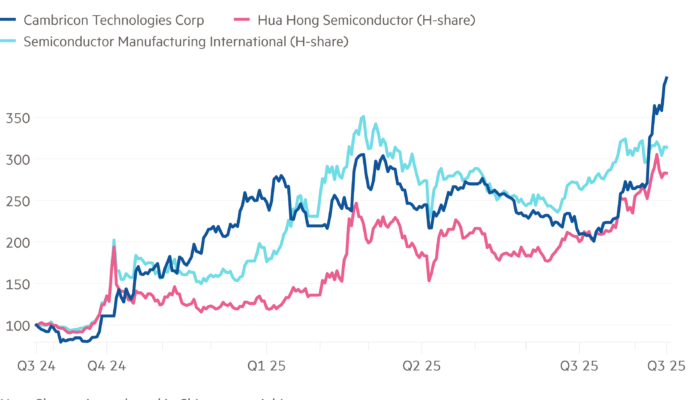Unlock the Editor’s Digest for free
Roula Khalaf, Editor of the FT, selects her favourite stories in this weekly newsletter.
Shares of Cambricon Technologies, one of China’s leading artificial intelligence chipmakers, surged to a record on Friday after AI start-up DeepSeek unveiled an updated model that would be compatible with Chinese-made semiconductors.
Cambricon’s Shanghai-listed shares jumped nearly 18 per cent, taking the company’s market capitalisation past Rmb500bn ($70bn) for the first time. Its value has more than quadrupled in the past year.
Chip foundries also gained on Friday, with Hong Kong-listed Semiconductor Manufacturing International Corporation and Hua Hong Semiconductor up 8 per cent and 12 per cent, respectively.
The moves came after DeepSeek released an update of its V3 model on Thursday, which it said was adapted “for the next generation of domestic chips”.
While the start-up did not specify individual chipmakers’ products, industry insiders and analysts said it was a positive signal that Chinese AI companies would use more domestic chips.
“If DeepSeek can use China-made chips, then the rest of the semiconductor universe will fly,” said Wee Khoon Chong, a senior strategist at BNY. “The potential demand for Chinese chips is going to be huge.”
Huawei is widely seen as the main competitor in China to Nvidia, with its Ascend AI chip series being broadly adopted by state-owned enterprises and telecoms companies. But the Shenzhen-based tech conglomerate is not listed, meaning investors have looked elsewhere to capitalise on news that China is pushing for domestic alternatives to the US chip giant.
Chinese regulators have also discouraged domestic tech companies from buying Nvidia’s H20 chip, a watered-down processor widely used for artificial intelligence in China.
“The fact that China can tell people not to buy H20 must mean they know there’s an alternative. Otherwise, they would just be shooting themselves in the foot,” said BNY’s Chong.
Nvidia chief executive Jensen Huang was in Taipei on Friday to discuss progress on its latest-generation Rubin AI chip with its contract chipmaker Taiwan Semiconductor Manufacturing Company.
He told reporters Nvidia was “in discussions” with the Chinese government to address reported security concerns about the H20 chip.
“Recently, China asked some questions about some security back doors in our chips,” he said. “We have made it very clear and put to rest that H20 has no security back doors.”


